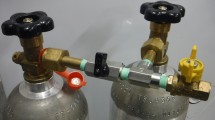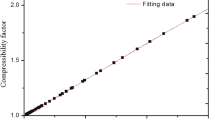Abstract
SOME time ago Prof. Chattock arid I attempted to measure the velocity of the ions from a point discharging in pure arid impure hydrogen at atmospheric pressure by the wind-pressure method, in the hope of finding that the negative ion was influenced by the presence of small traces of oxygen. The results were given in Phil. Mag., April, in which it was shown that the change which the complete elimination of oxygen caused was surprisingly great. Thus the apparent specific velocity of the negative ion in pure hydrogen was >23O cm. sec.-1, volt cm.-1, but it rapidly dropped to 7.6 on the addition of oxygen up to 1 per cent. The velocity of the positive ion was unaffected by traces of oxygen impurity, and was 5.8 throughout.
This is a preview of subscription content, access via your institution
Access options
Subscribe to this journal
Receive 51 print issues and online access
$199.00 per year
only $3.90 per issue
Buy this article
- Purchase on Springer Link
- Instant access to full article PDF
Prices may be subject to local taxes which are calculated during checkout
Similar content being viewed by others
Author information
Authors and Affiliations
Rights and permissions
About this article
Cite this article
TYNDALL, A. Velocity of Negative Ions in Hydrogen at Atmospheric Pressure. Nature 84, 530–531 (1910). https://doi.org/10.1038/084530d0
Published:
Issue Date:
DOI: https://doi.org/10.1038/084530d0
Comments
By submitting a comment you agree to abide by our Terms and Community Guidelines. If you find something abusive or that does not comply with our terms or guidelines please flag it as inappropriate.



